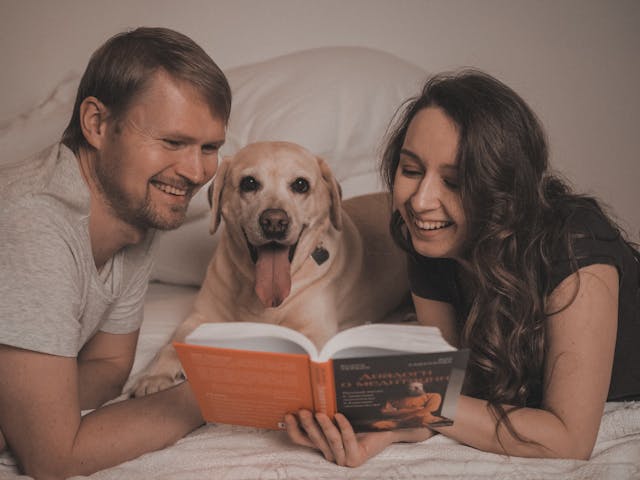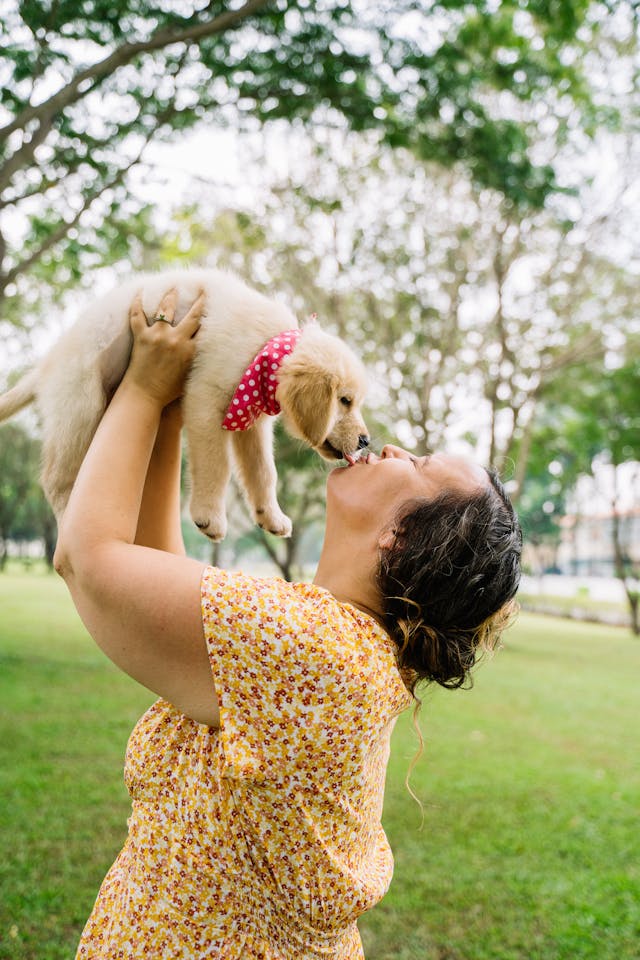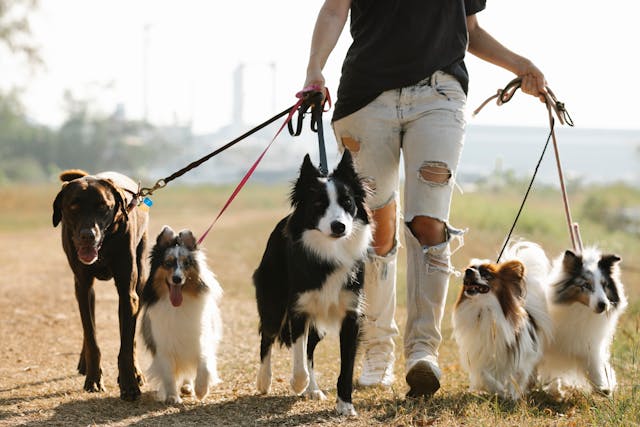Dogs lick one another as a unique way to show their affection. Many dog owners find it endearing (if slobbery) to have their dog kiss their face. What does a dog licking your face, nevertheless, really mean? Do any health risks, or is it safe? This blog post will look at the management of this habit and its prospective benefits and drawbacks. Knowing these things will help you maintain a good relationship with your dog and choose with knowledge whether to let him kiss your face
Highlighted Points
Reasons for Licking: Dogs lick for various reasons, including affection, communication, and taste.
Health Risks: Potential transmission of bacteria and parasites from dog saliva.
Benefits: Strengthening the bond between you and your dog, potential stress relief.
Managing the Behavior: Appreciating Your Dog’s Licking of Your Face
Dogs Lick Your Face, Why?
Socializing and Love
Dogs lick their owners’ faces mainly to show affection. Following licking, dogs are content and usually associate this behaviour with a good reward. A dog licking your face could signify their love and dedication to you. Dogs learn very early on that licking is a way to communicate their emotions and build relationships with their human friends.
Submittal and communication List of numbers
Like their wolf forebears, dogs lick to communicate in the wild. Moms lick puppy faces to request nourishment and attention. Adult dogs can lick other dogs or people to show their obedience or express their demands and wants. Their well-developed social structure means that licking is still how domesticated dogs interact with their human family members.
Exploration and Tasting
Dogs investigate their environment primarily through taste. As they kiss your face, your dog is also learning more about you. They can taste salt on your skin and detect scents that indicate where you have been and what you have been doing. This naturally curious tendency of a dog is part of its relationship with its environment.
Demanding Attention
Being highly social animals, dogs often seek affection from their human companions. Suppose your dog associates licking your face with incentives like petting or vocal praise. In that case, they may utilize this behaviour to get your attention.

Dog Health Issues
Even though a dog’s lick is often seen as harmless, it’s crucial to be aware of the potential health risks associated with this behavior.
Acute Bacterial Diseases
Dog saliva carries several potentially harmful bacteria for humans. The more dangerous Capnocytophaga bacteria, which can infect those with weakened immune systems, and the skin-infecting Pasteurella bacteria are widespread in dog mouths. Sometimes, these bacterial infections become systemic and result in serious health issues.
List of Parasites
Said to be transmitted by saliva, roundworms and hookworms can infect dogs. Your dog may have licked other animals or contaminated areas, which is how these parasites got on to you. Though it is less common as a way to transfer these parasites, licking is still something to be concerned about, particularly if your dog has yet to have a deworming recently.
Infections by Virus
Certain viruses that dogs may carry could put people at risk. While rare, saliva can transfer viruses from dogs to humans. One major and often fatal viral disease that dogs can carry is rabies. Although it seems highly unlikely that licking will spread rabies, it does emphasize the need to ensure your dog is immunized.
Fungal Illnesses
Fungus that dogs carry about can also cause human diseases. Ringworm is a fungus that can be spread, for example, by physical contact between dogs and humans. This fungus can be found in the saliva of your dog if they have come into touch with soil or animals that have been contaminated
Reactions
Swelling, redness, and itching can be reactions to dog saliva in some people. Under extreme conditions, more serious respiratory issues might arise. Never let your dog kiss your face if you have known dog allergies to prevent unfavourable reactions.

Health Advantages of Dog Licks
Let your dog kiss your face. There are benefits even with the potential risks. Here are some advantages of dog licking-
The Developing Relationship Between People and Animals
A natural behaviour of dogs, licking improves their bond with their humans. Your relationship will strengthen, and you will feel more affectionate and trusting if you allow your dog to lick you. The general health of the dog and the owner depends on this interaction since it promotes understanding and emotional connection.
In detoxification of stress
People find that dog interactions—especially getting licks—can be calming. By producing oxytocin, a hormone associated with bonding and stress reduction, while stroking and grooming, anxiety can be decreased and a sense of well-being encouraged. It could also be soothing for the dog to lick itself, creating a win-win scenario.
Offer Emotional Support
To many people, dogs provide companionship and emotional support. It can be comforting and give a sense of security to have a dog lick them, especially when alone or under stress. Happiness and life satisfaction can be raised generally; this emotional support can benefit mental health.

Dog Licks Handle Safely
If you enjoy having your dog lick you but prefer to lessen the health risks, here are some safe management strategies.
Common Veterinary Exams
Ensure your dog receives vaccines, regular veterinarian care, and parasite control drugs. A healthy dog spreads harmful bacteria or parasites less quickly. Routine veterinary examinations can also help detect and treat any health issues your dog may have, therefore lowering the risk of transmission to you.
Healthy Habits
Your dog may have licked you; afterwards, wash your skin with soap and water to kill germs. Don’t let your dog lick mucous membranes like your mouth, nose, eyes, or open wounds to reduce the risk of infection. Another part of maintaining adequate hygiene is washing your hands often after handling your dog, especially before eating or touching your face.
Training and Restraints
Dogs should be taught when and how not to lick. When your dog follows your instructions and respects your boundaries, reward it. Focus their licking behaviour on other socially acceptable things to do, such as playing or petting. To provide safer and more controlled contact and help manage the behavior in various situations, teach your dog to cease licking on demand.
Weekly Maintenance
If you keep your dog clean and well groomed, you will reduce its susceptibility to illnesses and parasites. Routine brushing, bathing, and dental care can help keep your dog clean and in general good health. A clean dog is less likely to be carrying potentially harmful bacteria that licks can spread.
Balanced Diet and Lifestyle
Give your dog a diet and lifestyle to support their immune system and reduce their chance of sickness. In general, an energetic, healthy dog is less prone to contract diseases that could be spread to humans by saliva.
Logging Activities
Watch how your dog licks—excessive licking could indicate underlying medical or behavioural issues. To rule out any changes in your dog’s licking behaviour, take him to a veterinarian.
Recap
Having your dog kiss you on the face is a cute and joint action that can strengthen your bond and provide emotional support. Still, the potential health risks must be identified, and steps done to lessen them. If you maintain good hygiene, ensure your dog is healthy, and set sensible boundaries, you may safely enjoy the affectionate licks of your furry friend. Knowing the reasons for and solutions for this behavior will help you and your dog maintain a happy and healthy relationship.
With the correct safety measures, dog licks are manageable despite their certain risks. Appreciating the positive aspects of this behaviour and taking the necessary safety precautions will enable you to continue to cherish the special bond you have with your pet. Remember that a dog that is happy and healthy interacts with you more happily and worry-free



